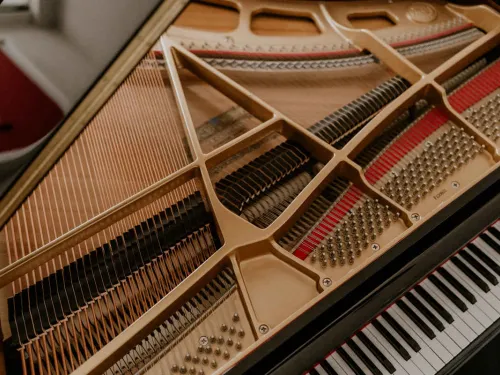Have you ever wanted to know more about classical music but felt too intimidated to ask? Have you ever been at a concert and enjoyed it, but felt like you didn't totally know what was going on?
Or, are you a classical music enthusiast who wants to know more about your favourite works, or explore some pieces you haven't heard before?
Each session is independent so why not try one out?
Music Appreciation (Friday @Semitone)
Advanced Music Appreciation (Wednesday online)

Semitone's music appreciation classes might be for you. It's informed, but informal; complete but casual. If you want to develop a better appreciation of classical music, then you have to listen to it. Peter introduces each piece by saying something about the composer's place in the development of music, how the piece came to be written and what to listen out for before we listen to it. We listen together, and share our own reactions to each piece.
For any questions about music appreciation classes, please email info@semitonestudios.com or ring 07715 643110.
Music Appreciation
This course is for everyone - you needn't have any prior knowledge of classical music in order to fully enjoy this course.
Current Session
Day/Time/Location:
Friday/10:30am-12pm/@Semitone Studios
Cost: £84 for all twelve sessions or £8 for each individual session.
(If the cost is a hardship, please let us know and you may pay what you can afford.)
The programme for the first quarter of 2026 introduces as usual a varied selection of works from the last 300 years or so.
Friday 09 January: Joseph Haydn, Symphony No 89 in F major, written in 1787 making use of music from a lire organizzata (a hurdy-gurdy) concerto written for the king of Naples in 1786.
Friday 16 January: Franz Schubert, Mass No 4 in C major, written in 1816 and the only one of Schubert’s six masses published in his lifetime.
Friday 23 January: Antonín Dvořák, Symphony No 2 in B flat major, Opus 4, one of the early Dvořák symphonies which never seem to be performed but are well worth a hearing.
Friday 30 January: Claude Debussy, Images pour orchestra, written between 1905 and 1912, the central section of three, called Ibéria, is an evocation of Spain admired by Manuel de Falla.
February 6 February: Edward Elgar, The Music Makers, Opus 69, setting a poem by Arthur O'Shaughnessy, his last major choral piece containing many quotations of his own music.
February 13 February: Elsa Barraine, Symphony No 2, Voïna, the second of two symphonies by this twentieth century French composer written in 1938 anticipating the forthcoming war.
February 20 February: Jan Dismas Zelenka, Ouverture a 7 concertanti, ZWV188, which is an orchestral suite, one of the four orchestral works he wrote during his visit to Prague.
February 27 February: Ludwig van Beethoven, Symphony No 6 in F major, Opus 66, Pastoral, written alongside the fifth symphony and both were first performed at a marathon concert in 1808.
Friday 6 March: Louise Farrenc, Symphony No 1 in C minor, Opus 32, completed in 1841 by this piano professor at the Paris Conservatoire was first performed in Brussels in 1845.
Friday 13 March: Sibelius, En saga, Opus 9, and Night Rise and Sunset, Opus 55, two tone poems by this composer, the first was a piece which helped establish his reputation.
Friday 20 March: Gerald Finzi, Intimations of Immortality, Opus 29, a setting of words from Wordsworth’s poem for tenor, chorus and orchestra, first performed in 1950.
Friday 27 March: Michael Tippett, A Child of our Time, an oratorio written in response to the events of Kristallnacht in 1938 and first performed in 1944; too long for a single session so we will focus on the second of the three parts which incorporates three African American spirituals.
Friday 03 April: Good Friday, No Session
Advanced Music Appreciation
This course is for listeners who have at least basic knowledge of classical music - terminology, form, etc. Please enquire if you are unsure.
These Classes will resume in January 2026
Day/Time/Location: Wednesday/2:00pm-4:00pm/Online via Zoom
Cost: £130 for all twelve sessions or £13 for an individual session.
(If the cost is a hardship, please let us know and you may pay what you can afford.)
These online sessions set out to explore a range of classical music composed over the past three hundred years or so, including music in a variety of genres: orchestral, instrumental, choral and songs. The aim to is to include some well-known pieces but also to explore less familiar repertoire; there is such a wealth of music that we do not normally hear. The theme for each course is chosen to provide a framework for this. Pieces will be introduced and then we will listen to them and share reactions.
Many composers have made use of music written by others, sometimes simply quoting a theme and sometimes writing variations on another’s theme, and sometimes they quote their own music.
This course of twelve sessions will explore some of the music which has resulted and the original music being used.
Wednesday 7 January: Quoting Johann Sebastian Bach
Wednesday 14 January: Composers using folk music
Wednesday 21 January: Self-quotation by Dmitri Shostakovich
Wednesday 28 January: Michael Tippett quoting Arcangelo Corelli, Johann Sebastian Bach and himself
Wednesday 4 February: Ludwig van Beethoven using themes by Wolfgang Amadeus Mozart and Mozart quoting Johann Christian Bach
Wednesday 11 February: Béla Bartók quoting Dmitri Shostakovich quoting Franz Lehár
Wednesday 18 February: mid-semester break
Wednesday 25 February: Self-quotation in Edward Elgar’s The Music Makers
Wednesday 4 March: Camille Saint-Saëns quoting Jean-Philippe Rameau, Jacques Offenbach, Hector Berlioz, Felix Mendelssohn and Gioacchino Rossini
Wednesday 11 March: Composers using the Dies Irae plainchant
Wednesday 18 March: Variations on themes by Johann Sebastian Bach
Wednesday 25 March: Ralph Vaughan Williams and Benjamin Britten using Thomas Tallis and John Dowland
Wednesday 1 April: Composers using African-American spirituals
